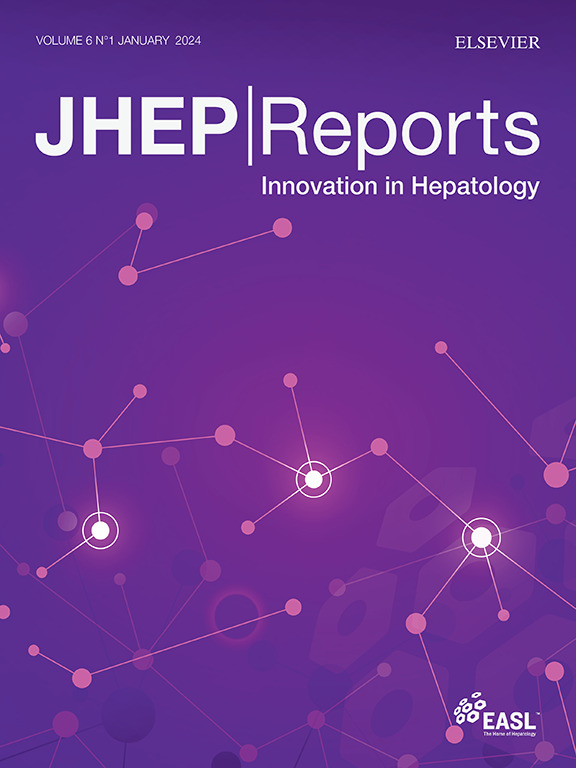Hepatic IR and IGF1R signaling govern distinct metabolic and carcinogenic processes upon PTEN deficiency in the liver
IF 9.5
1区 医学
Q1 GASTROENTEROLOGY & HEPATOLOGY
引用次数: 0
Abstract
Background & Aims
Hepatocyte-specific deficiency of the phosphatase and tensin homolog (PTEN) triggers steatosis and the development of hepatic tumors. The hepatoprotective effect of PTEN may partly depend on its ability to block insulin receptor (IR) and insulin-like growth factor 1 receptor (IGF1R) signaling. This study aimed to evaluate the individual/combined contributions of IR and IGF1R to hepatic metabolism and tumorigenesis induced by PTEN deficiency.
Methods
Mouse models with hepatocyte-specific deletions of Insr, Igf1r, or both, in addition to Pten, were used to investigate the distinct/combined roles of IR and IGF1R. Analyses focused on the impact of these deletions on hepatic steatosis and metabolism, whole-body adiposity, and liver tumor incidence.
Results
IR and IGF1R signaling contribute to steatosis induced by Pten ablation through distinct mechanisms. Hepatic IGF1R regulates hepatic glucose output and glycogen storage (2.1-fold increase in hepatic glycogen in PTEN-IGF1RKO mice [n = 10], compared with PTENKO mice [n = 7], p <0.0001). In contrast, hepatic IR exerts a stringent regulation on whole-body adiposity (4-fold increase in white adipose tissue volume in PTEN-IRKO mice [n = 5], compared with PTENKO mice [n = 6], p = 0.0004). Interestingly, triple knockout (Insr, Igf1r, and Pten) in hepatocytes of young adult mice is largely asymptomatic, indicating that PTEN deficiency exerts a major overriding control on the effects of Insr and Igf1r deletion. Furthermore, the combined loss of IR and IGF1R signaling in PTEN-deficient livers restrains liver carcinogenesis, but both receptors have individually distinct effects on the malignancy of liver cancers, with IR deficiency reducing overall cancer incidence and IGF1R deficiency promoting malignancy.
Conclusions
These findings increase our understanding of the intricate interplay between PTEN, IR, and IGF1R signaling and provide valuable insights into potential therapeutic interventions in hepatic disorders and hepatocellular carcinoma.
Impact and implications:
This study underscores the pivotal roles of phosphatase and tensin homolog (PTEN), insulin receptor (IR), and IGF-1 receptor (IGF1R) in controlling liver metabolism, systemic adiposity, and liver cancer progression. Our findings on the distinct and combined effects of these receptors in PTEN-deficient mice offer key insights into the mechanisms driving metabolic dysfunction-associated steatotic liver disease and related hepatocarcinogenesis. In addition, this research reveals the potential of IR and IGF1R as biomarkers in liver cancer development, presenting new opportunities for therapeutic targeting and disease monitoring.

求助全文
约1分钟内获得全文
求助全文
来源期刊

JHEP Reports
GASTROENTEROLOGY & HEPATOLOGY-
CiteScore
12.40
自引率
2.40%
发文量
161
审稿时长
36 days
期刊介绍:
JHEP Reports is an open access journal that is affiliated with the European Association for the Study of the Liver (EASL). It serves as a companion journal to the highly respected Journal of Hepatology.
The primary objective of JHEP Reports is to publish original papers and reviews that contribute to the advancement of knowledge in the field of liver diseases. The journal covers a wide range of topics, including basic, translational, and clinical research. It also focuses on global issues in hepatology, with particular emphasis on areas such as clinical trials, novel diagnostics, precision medicine and therapeutics, cancer research, cellular and molecular studies, artificial intelligence, microbiome research, epidemiology, and cutting-edge technologies.
In summary, JHEP Reports is dedicated to promoting scientific discoveries and innovations in liver diseases through the publication of high-quality research papers and reviews covering various aspects of hepatology.
 求助内容:
求助内容: 应助结果提醒方式:
应助结果提醒方式:


